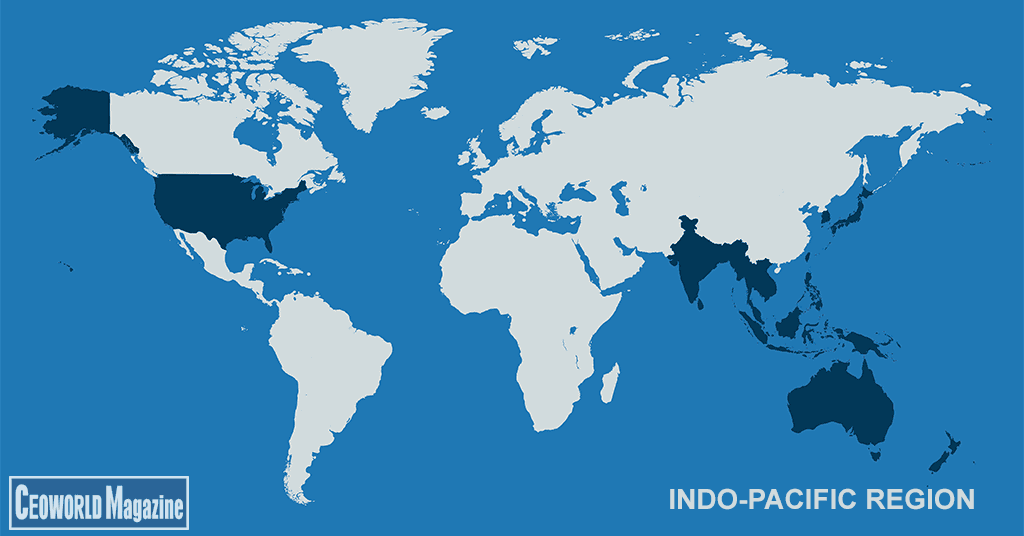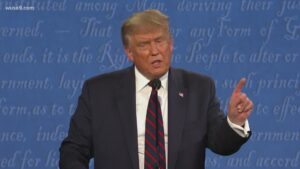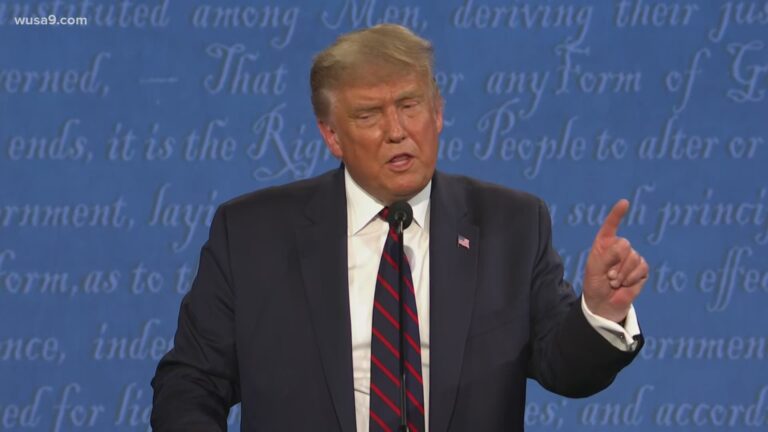
Indo Pacific Region-ceoworld.biz
STRATEGIC ASSESSMENT. U.K. Prime Minister Rishi Sunak flew to Washington to met U.S. President Joe Biden and Australian Prime Minister Antony Albanese. The three of them will talk about the specifics and content of their cooperation in the creation of the nuclear-powered submarines that Australia will purchase.
The transfer of nuclear technology, non-nuclear countries, as well as personnel changes at the White House, however, are likely to hinder the plan. “I am traveling to the United States today to launch the next stage of the AUKUS nuclear submarine program, a project which is binding ties to our closest allies and delivering security, new technology, and economic advantage at home,” Sunak said.
The AUKUS alliance, which comprises the United States (US), Australia and Britain, had on Monday announced a plan to provide Australia with nuclear-powered military submarines from the early 2030s in order to counter what they claimed to be China’s ambitions to establish its hegemony in the Indo-Pacific region.
According to media reports, Australia will buy 5 nuclear-powered submarines as part of its deal with the United States (US). With the AUKUS alliance kicking off the Indo-Pacific version of the ‘Great Game’ in its backyard, Indonesia has repeatedly expressed concerns over regional stability.
“Indonesia expects Australia to remain consistent in fulfilling its obligations under the NPT and IAEA Safeguards, as well as to develop with the IAEA a verification mechanism that is effective, transparent and non – discriminatory,” the Indonesia government said in a statement.

U.S. President Joe Biden will meet leaders of Australia and Britain in San Diego on Monday to announce a way forward for Australia to receive nuclear-powered submarines in Canberra’s biggest-ever defense project. The three countries announced the so-called AUKUS plan in 2021 as part of efforts to counter China in the Indo-Pacific region.
However, questions remain over strict U.S. curbs on the extensive technology sharing needed for the project and about the length of time it will take to deliver the submarines. Australia is expected to buy up to five U.S. Virginia class nuclear-powered submarines in the 2030s as part of the landmark agreement to be revealed in detail by Biden.
U.S. Assistant Secretary of State for East Asian and Pacific Affairs Daniel J. Kritenbrink, during an online press briefing, said that the AUKUS Partnership aims to promote a secure and prosperous Indo-Pacific. Kritenbrink made the remarks after announcing Australia’s acquisition of a conventionally armed nuclear-powered submarine through the AUKUS Partnership.
Kritenbrink said the partnership aims to assist Australia in modernizing its submarine fleet to apply the same technology, i.e. nuclear-powered submarines that other countries, such as India, China, France, the United Kingdom, Russia, as well as the United States, have already deployed in the region.
Australian Ambassador to Indonesia Penny Williams replied to the Indonesian Foreign Affairs Ministry’s tweet regarding AUKUS, in which Indonesia asked Australia to consistently fulfill its obligations under the nuclear weapons non-proliferation regime.
“Australia appreciates Indonesia’s ongoing engagement with AUKUS,” Penny said in her tweet. “AUKUS is making a positive contribution to regional peace and stability, and Australia will continue to work openly and transparently with the IAEA to develop an appropriate and robust nuclear non-proliferation approach,” she continued.
Indonesia was the first in the region to react to the detailing of Australia’s $368 billion submarine plans, with Prime Minister Anthony Albanese attempting to soften the blow with an early phone call to Indonesia President Jokowi amid a blitz of briefings of world leaders.
“Indonesia’s standpoint is clear that our archipelagic sea lanes cannot be used for activities related to war or preparation of war or non-peaceful activities,” said Tubagus Hasanuddin, a senior member of the ruling Democratic Party of Struggle (PDI-P) and of Indonesia’s parliamentary committee overseeing foreign affairs, defense, and intelligence.
Hasanuddin, a retired two-star army general, added in an interview with The Sydney Morning Herald and The Age: “As long as vessels are made not for war, it is no problem. For instance, the U.S. Seventh Fleet passes for patrol, for exercises, it is no problem. But AUKUS is created for fighting.”
Australian Prime Minister Anthony Albanese and British Prime Minister Rishi Sunak, four U.S. officials told Reuters this week. The agreement would have multiple stages with at least one U.S. submarine visiting Australian ports in the coming years and end in the late 2030s with a new class of submarines built with British designs and American technology, one of the officials said.
The code of conduct (CoC) for the South China Sea, being drawn up by ASEAN and China, will have to be one that is effective and substantive, said Sidharto R. Suryodipuro, director-general for ASEAN cooperation at Indonesia’s Foreign Affairs Ministry.
Speaking at a briefing on Friday after officials from ASEAN and China held meetings on the COC, Sidharto noted that talks have been progressing, and there is a commitment from all sides to intensify negotiations. While he did not reveal specific details of the three-day discussions,
Sidharto emphasized that the priority for the CoC is to be “actionable.” “We do not want the agreement to just be a document where parties are agreeing for the sake of agreeing. Thus, the CoC has to be effective, substantive, and actionable,” he said.
Indonesian Foreign Affairs Ministry spokesperson Teuku Faizasyah said Indonesia was disappointed with the meeting between Fijian Prime Minister Stiveni Rabuka and Free Papua Movement (OPM) separatist leader Benny Wenda. Indonesia has informed the Fijian Embassy in Jakarta about the protest.
Additionally, Rabuka has also met the Indonesian Foreign Affairs Ministry privately. According to him, Indonesia voiced displeasure over the Fijian PM’s support for the Papuan separatist movement. It is known that Rabuka and Wenda met each other at the recent gathering of Pacific nations in Nadi, Fiji.
US President Joe Biden has sought to dispel fears over a potential financial crisis following the rapid collapse of two major United States banks, saying customers would be protected and can trust that the country’s banking system is “safe”.
During a brief news conference at the White House, Biden said he would seek to hold those responsible to account and push for better oversight and regulation of larger banks, while he also promised that “no losses would be borne by the taxpayers”.
President Joe Biden meets on Monday with the leaders of Australia and the United Kingdom at a California naval base for an expected announcement of a nuclear submarines deal aimed at stabilizing the Asia-Pacific region as it faces a rising China.
Australian Prime Minister Anthony Albanese and U.K. Prime Minister Rishi Sunak will join Biden at the base in San Diego 18 months after their countries formed an alliance called AUKUS with the principal goal of bringing Australia into the fold of navies possessing nuclear-powered submarines.
While Australia has ruled out deploying atomic weapons, its acquisition of the nuclear-powered vessels will transform its role in a United States-led project to maintain the decades-old balance of power in the Pacific.

China’s reappointment of Xi Jinping as president and its surprise diplomatic salvo to broker peace between Iran and Saudi Arabia has garnered praise from the country’s international beneficiaries, not least from Indonesia, which analysts believe would stand to gain from the Chinese strongman’s continued reign.
President Jokowi was quick to congratulate Xi on his record third reelection on Friday, taking to Twitter to heap praise on the leader of one of Indonesia’s top economic partners and express his eagerness to continue cooperating with Beijing. For Indonesia in particular, which has cooperated closely with China in economic projects, Xi’s enduring reign could be good news, although the experts also warned that neutrality remained the best policy.
Indonesia is concerned about the presence of foreign alliances and militaries in the region surrounding the country. The alliance has led to an increase in the nuclear arms race and deployments in the region.
Derek Grossman, a senior researcher at RAND, said that it was clear that Indonesia did not like AUKUS. Therefore, Indonesia openly criticized the military alliance agreement Australian Ambassador to Indonesia Penny Williams responded to the Indonesian Foreign Affairs Ministry regarding Indonesia’s concerns.
“Australia appreciates Indonesia’s ongoing engagement with AUKUS. AUKUS is making a positive contribution to regional peace and stability, and Australia will continue to work openly and transparently with the IAEA to develop an appropriate and robust nuclear non-proliferation approach,” the Australian Embassy in Jakarta said.
Indonesia is calling on Australia to fulfill its nuclear nonproliferation duties under international law, following an update on a trilateral defense pact that equips its neighbor with up to five nuclear-powered submarines by the 2050s.
The Foreign Ministry took to Twitter to state Indonesia had been closely following the recent developments on the AUKUS security arrangement, particularly regarding the “pathway to achieve critical capability.”
The ministry made no direct mention of the plan for Australia to purchase nuclear submarines from the United States and the United Kingdom, but the statement came hours after a joint statement by U.S. President Joe Biden, Australian Prime Minister Anthony Albanese, and U.K. Prime Minister Rishi Sunak.
A U.S. interagency delegation is in Bali, Indonesia, for the second round of negotiations for the Indo-Pacific Economic Framework for Prosperity (IPEF), which runs from March 13 to 19. Indonesia’s Economic Affairs Coordinating Ministry is hosting the Bali IPEF negotiating session.
The U.S. delegation is led by Sarah Ellerman, IPEF Pillar I Chief Negotiator and U.S. Trade Representative (USTR) Assistant for Southeast Asia and the Pacific (Acting), and Sharon H. Yuan, Department of Commerce Counselor and Chief Negotiator for Pillars II-IV.
Negotiators from 14 countries are participating in the current negotiating round. U.S. Ambassador to Indonesia Sung Y. Kim thanked Indonesia for hosting hundreds of negotiators from throughout the Indo-Pacific this week to promote prosperity and development throughout the region.
Several countries have criticized AUKUS after Canberra’s announcement. China through its Foreign Affairs Ministry Spokesperson Wang Wenbin condemned this and said, “The latest joint statement issued by the United States, the United Kingdom, and Australia shows that the three countries have gone further down the wrong and dangerous path for their own geopolitical self-interest, completely ignoring the concerns of the international community.”
Meanwhile, Russian Presidential Spokesperson Dmitry Peskov said the plan to purchase and develop nuclear-powered submarines raises questions about the nuclear non-proliferation agreement that the United States and its allies have been promoting. Indonesia also expressed concerns about the cooperation.
Malaysia through its Foreign Affairs Ministry asked all parties to respect Malaysia’s stance and approach towards nuclear-powered submarines. In an official statement, it asked AUKUS to comply with the 1982 U.N. Convention on the Law of the Sea (UNCLOS), the Southeast Asia Nuclear Weapon-Free Zone Agreement (SEANWFZ), and the ASEAN Declaration on the Zone of Peace, Freedom, and Neutrality (Zopfan).
A strong rebound by financials helped Wall Street’s main indexes close firmly positive, after some of the country’s largest lenders came to the rescue of embattled First Republic Bank.
The technology sector also contributed to the gains, helping to boost the Nasdaq Composite to its strongest performance since Feb. 2, 2022.
The latest twist in the U.S. regional banks saga came on the heels of a 50 basis point rate hike by the European Central Bank, which earlier in the day had dampened investor sentiment already hurt by fears of a banking crisis.
The U.S. leading economic index fell 0.3% in February — the 11th decline in a row — continuing to signal an upcoming recession. Economists polled by the Wall Street Journal had forecast a 0.4% drop.
The economy has slowed due to the end of pandemic stimulus and the effects of high inflation, which has forced the Federal Reserve to raise interest rates. Higher borrowing costs typically tame inflation, but at the cost of weaker economic growth. “The leading economic index still points to risk of recession in the U.S. economy,” said Justyna Zabinska-La Monica, senior manager of business cycle indicators at the board.
The Biden administration said that it has held a second round of negotiations for its signature Asia engagement project on topics including labor, environment, digital trade, and technical assistance.
The economic initiative known as the Indo-Pacific Economic Framework (IPEF), which President Joe Biden launched last May, is aimed at countering China’s efforts to expand its own economic influence in the region. Ahead of the negotiations, U.S. officials shared “Pillar I” negotiating text on labor, environmental, digital trade, and technical assistance.
The U.S. State Department has approved Australia’s request to buy up to 220 long-range Tomahawk cruise missiles, making it only the second US ally to obtain the US-made weapon after the United Kingdom.
A United States official has said that the deposit outflows that left many regional banks reeling in the wake of Silicon Valley Bank’s failure had slowed and in some cases reversed, even as investors were trying to ascertain whether the crisis was contained.
Shares of regional banks such as First Republic Bank, PacWest Bancorp and Western Alliance Bancorp have plunged since the banking crisis started on March 8 with the collapse of Silvergate Capital Corp and intensified as US regulators took over Silicon Valley Bank and Signature Bank.
Markets have been trading as if the end of the world is at hand – but what most participants see, behind the recent financial turmoil and contagion fears, is a still-strong US economy, the MLIV Pulse survey shows.
The collapse of three US banks and the scramble to rescue others, including Europe’s Credit Suisse Group AG and First Republic Bank, sent stocks and bond yields plunging. Bets on Federal Reserve monetary tightening got dialed back, swap contracts reflect expectations for rate cuts within months, and recession warnings are ramping up.
According to a statement from the Defense Security Cooperation Agency, the deal will cost as much as 1.3 billion Australian dollars ($895 million), including maintenance and logistical support. The deal’s approval comes the same week the US, Australia and the United Kingdom provided more details of AUKUS, their three-way pact to share technology and resources to build a fleet of nuclear-powered submarines.
The United States and Philippines will announce new sites as soon as possible for an expanded Enhanced Defense Cooperation Agreement (EDCA), which gives the Western power access to military bases in the Southeast Asian country.
Philippine President Ferdinand Marcos Jr last month granted the United States access to four military bases, on top of five existing locations under the 2014 EDCA, which comes amid China’s increasing assertiveness towards the South China Sea and self-ruled Taiwan.

Facing the possibility of criminal charges, Donald Trump waited it out in Florida on Tuesday as New York braced for disruptions that could follow an indictment. Republican contenders in the 2024 race sized up the impact a prosecution could have on a campaign in which the former president is a leading contender.
Trump over the weekend claimed without evidence that he would be arrested on Tuesday, but there was no indication that prediction would come true. A Manhattan grand jury did appear to take an important step forward on Monday by hearing from a witness favorable to Trump, presumably so prosecutors could ensure the panel had a chance to consider any testimony supporting his version of events.
The statement issued by Israeli Finance Minister Bezalel Smotrich, which denied the existence of Palestine, drew condemnation from a number of countries, including Indonesia. “Indonesia strongly condemns the position of the Israeli Finance Minister who denies the existence of the Palestinian nation and does not respect the existence and territorial sovereignty of Jordan,” the Indonesian Foreign Affairs Ministry tweeted, adding that Indonesia supports Palestine unwaveringly and upholds Jordan’s territorial sovereignty.







